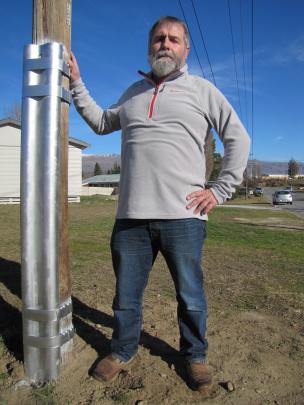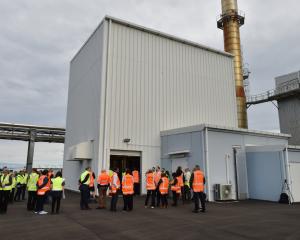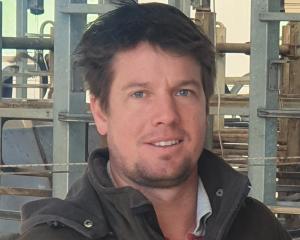As the recent falling of a power pole on to an Alexandra property again draws attention to the condition of Otago’s power poles, Pam Jones takes an updated look at the region’s replacement programme. Is it on track and is the public’s safety assured, or are the concerns of some about the issue still justified?
Of all the things to be glad of, it was Hugo's safety most on their mind, and a neighbour's advice most appreciated.
Alexandra couple Danielle and Ryan Lomman had just realised the loud bang they heard was a power pole that had fallen through their fence and left live wires sitting on their roof.
They gathered their dog Hugo and left the house quickly, but not before a neighbour had called over the fence to warn them not to touch any surfaces. Live power lines on your roof can conduct electricity inside your home and make metal surfaces live. The Lommans said they felt lucky - lucky their dog wasn't outside in the front yard where he often played and where the pole had fallen, lucky they had good neighbours, lucky no-one was hurt.
The Eureka St pole was replaced by Aurora Energy within about three hours and the Lommans said the response of linemen - the unsung heroes in any power pole issue - and emergency services to the August 13 incident was exemplary; they couldn't fault it. An unfortunate incident had brought out the best in the community.
But it has also put the spotlight back on the state of power poles in the region. Aurora's power pole replacement programme is well advanced and on track to be completed on schedule. So why are power poles still falling down?
The Eureka St incident resulted in an apology from Aurora, which is investigating the incident, and WorkSafe was notified. Aurora rechecked other poles in the Eureka St area, and said ``below-ground deterioration'' of the pole was thought to be why it fell (a photo seen by the Otago Daily Times indicated the bottom of the pole was completely rotten).
Aurora said there was no evidence work on an adjacent pole just days before had contributed to the pole falling over, although it would include it in the scope of the investigation.
The work on the adjacent pole - a practice known as pole-nailing, where a steel ``nail'', or truss, is inserted down the side of a power pole and strapped to it to strengthen and safeguard the pole, much like a stake would be driven into the ground and attached to a tree - attracted the attention of former Delta employee Richard Healey, whose revelations last year about Delta's power pole practices brought Delta and then sister company Aurora under public scrutiny.
Mr Healey made a special trip to Alexandra from Dunedin just to inspect the replacement pole and the one beside it that had been nailed. He said he was ''deeply concerned'' about the incident and the potential dangers of pole nailing. He said the force required for pole nailing could weaken that pole as well as the poles and ground structure around it and put poles at risk of falling. He was particularly concerned ground condition was not tested before a pole was nailed.
Aurora operations and risk general manager John Campbell replied, saying pole-nailing was a proven and effective alternative that was well-tested and common practice (he did not comment about whether ground condition was tested, but a subsequent Aurora statement said ``The Australian/New Zealand standard provides guidance on how to factor various soil types into the design of overhead power lines and is applied in the same manner for wooden poles, reinforced wooden poles and concrete poles'').
Mr Healey's comments are the latest in almost a year of him speaking out about a ``neglected and decaying'' power pole network he says has become a danger to the public because of under-investment by Delta. Leaked documents showed Aurora had been warned about the possible scenario but failed to act. Several others have also spoken out, criticising the management and condition of the pole network, some publicly, some anonymously.
Others still have concerns.
The Otago Daily Times spoke to three Delta staff (who did not want to be named) after the Eureka St incident and all had concerns about Aurora's pole replacement programme. One said Aurora had started pole nailing to keep up with its pole replacement programme, another said it was being done to save money, a third said Delta linemen had received little training about how to work on poles that had been nailed. He said staff had been told nailed poles were ``theoretically safe to climb'', but it was up to individual linemen to decide if they wanted to climb such a pole.
One of the staff said morale among Delta staff continued to be low, although all were glad to still have a job. He said linemen did have the skills to assess whether a pole was safe to climb in standard daytime conditions, but was concerned an emergency crew replacing a fallen pole in pressured and challenging conditions, for example at night-time in bad weather, would find that harder to assess and could be placed at risk.
He defended the practice of pole nailing to an extent, saying it was a good temporary solution that could extend the life of a power pole by several years, and new methods of installing the nail into the ground used less force than other methods previously trialled. However, he said it was possible the nailing of the pole in Eureka St had contributed to the falling of the adjacent pole.
But he said his main concern was that the pole replacement programme of Aurora/Delta was poorly documented, and that not all poles assessed as red-tagged were on the pole replacement programme.
The pole that fell in Eureka St had had both red and blue tags, but had not been on the replacement programme, he said.
The Otago Daily Times emailed a series of questions to Aurora. It responded with general comment about Aurora staff and contractors working under industry safety regulations and following Electricity Engineers' Association guidelines, and provided an update on its Fast Track Pole Programme, but did not answer other questions, saying ``In the interests of accurate and balanced information, we are not prepared to respond to conjecture from unnamed sources - we don't believe that's constructive for your readers or our customers, especially where it relates to technical issues and safety''.
The statement did not confirm whether the Eureka St pole that fell was red-tagged but not on the pole replacement programme; say why pole nailing was being done when there was no mention of it in the initial Accelerated Pole Replacement Plan as included in the December 2016 Deloitte review of Aurora and Delta; or say whether a recommendation in the Deloitte report that ``a robust risk assessment and due diligence should be performed prior to the completion of the business case'' for pole nailing had been followed.
The information Aurora provided about the Fast Track Pole Programme said by the end of July this year 1600 of the 2910 poles due for remediation had been completed - 500 in Central Otago, 230 in Queenstown Lakes and 870 in Dunedin.
``With up to 20 crews working throughout the region we remain on track to complete the remaining poles by the end of year. We expect of the 2910 poles, about 900 will be reinforced [nailed], the remainder will be replaced, repaired or reassessed.''
The Aurora network had a total of 54,000 power poles, of which 31,200 were wooden and 22,800 concrete or steel, the statement said.
Mr Healey said his initial concerns remained, and he was also concerned about other practices.
He is concerned about the use of metal power poles, which he says can create dangerous ``step voltage'' [the voltage between the feet of a person standing near an energised grounded object].
He is also worried about the high loads being carried on red tagged power poles in rural areas (rural wires typically carry far higher voltage than those on poles in urban areas).
Aurora did not answer questions from the Otago Daily Times about any potential risks from metal power poles or those in rural areas.
Mr Healey has laid a complaint with WorkSafe about the Eureka St incident and continues to try to correspond with WorkSafe about his broader concerns about the power pole network, but says he has received scant response.
The Otago Daily Times asked WorkSafe if it had made a decision about whether to prosecute Aurora/Delta over the state of its power poles; in May a spokesman said no decision had yet been made.
A response from senior communications adviser, strategy and performance group Chris Baylis did not answer the question, but said ``WorkSafe is satisfied with Aurora's approach to improving their network and the progress to date. However, enforcement tools such as prosecution remain options if they are required''.
Mr Baylis said WorkSafe was ``continuing to engage'' with Aurora around the performance of its pole replacement programme, and the condition of its network generally.
















